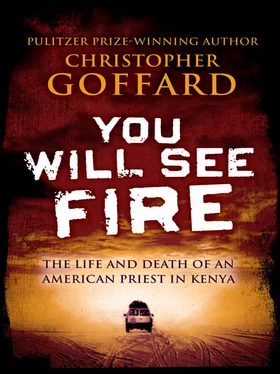JOHN KAISER WAS beginning to glimpe the scope of Moi’s cruelty as early as 1986 and 1987. He was living in Nyangusu, on the border between the dense farming area of the Kisii and the sparsely populated vastness of Masailand. For years, he’d watched the groups skirmish over cattle and boundary lines, staging elaborate—and mostly harmless—face-offs that Kaiser viewed “more as recreation than a serious war.” Конец ознакомительного фрагмента. Текст предоставлен ООО «ЛитРес». Прочитайте эту книгу целиком, купив полную легальную версию на ЛитРес. Безопасно оплатить книгу можно банковской картой Visa, MasterCard, Maestro, со счета мобильного телефона, с платежного терминала, в салоне МТС или Связной, через PayPal, WebMoney, Яндекс.Деньги, QIWI Кошелек, бонусными картами или другим удобным Вам способом.
He’d watched as combatants assembled on either side of the mission football field, hurled menacing insults at one another through the night, and unleashed high arrow volleys that rarely proved fatal. If killing had truly been the aim, Kaiser reasoned, they would have charged with their spears.
But what he witnessed now Конец ознакомительного фрагмента. Текст предоставлен ООО «ЛитРес». Прочитайте эту книгу целиком, купив полную легальную версию на ЛитРес. Безопасно оплатить книгу можно банковской картой Visa, MasterCard, Maestro, со счета мобильного телефона, с платежного терминала, в салоне МТС или Связной, через PayPal, WebMoney, Яндекс.Деньги, QIWI Кошелек, бонусными картами или другим удобным Вам способом.
, in the mid-1980s, had a different feel entirely. Thousands of Kisii peasant farmers were streaming through the countryside with their belongings. Political bosses had ferried in gangs of Masai warriors to burn their homes and destroy their schools. Informants told Kaiser the attackers belonged to the private mercenary army of William ole Ntimama, then the regime’s most powerful Masai. Investigating the refugees’ claims, Kaiser witnessed government paramilitaries and police evicting farmers from their land en masse as the police stood by passively, intervening only when the Kisii fought back.
In early 1988, Kaiser took the news to his bishop, Tiberius Mugendi, an aging Kenyan whom he regarded as a spiritual father. Mugendi had assumed the violence reflected “the usual fights over cattle rustling” Конец ознакомительного фрагмента. Текст предоставлен ООО «ЛитРес». Прочитайте эту книгу целиком, купив полную легальную версию на ЛитРес. Безопасно оплатить книгу можно банковской картой Visa, MasterCard, Maestro, со счета мобильного телефона, с платежного терминала, в салоне МТС или Связной, через PayPal, WebMoney, Яндекс.Деньги, QIWI Кошелек, бонусными картами или другим удобным Вам способом.
and dismissed the possibility of government involvement: “Impossible!” Конец ознакомительного фрагмента. Текст предоставлен ООО «ЛитРес». Прочитайте эту книгу целиком, купив полную легальную версию на ЛитРес. Безопасно оплатить книгу можно банковской картой Visa, MasterCard, Maestro, со счета мобильного телефона, с платежного терминала, в салоне МТС или Связной, через PayPal, WebMoney, Яндекс.Деньги, QIWI Кошелек, бонусными картами или другим удобным Вам способом.
That would mean the sanction of Moi, and Moi was the country’s benevolent father.
Little would be written about the mid-1980s clashes, and Kaiser would later castigate himself for his passivity. Concerning the violence, he believed himself “the best informed Christian” Конец ознакомительного фрагмента. Текст предоставлен ООО «ЛитРес». Прочитайте эту книгу целиком, купив полную легальную версию на ЛитРес. Безопасно оплатить книгу можно банковской картой Visa, MasterCard, Maestro, со счета мобильного телефона, с платежного терминала, в салоне МТС или Связной, через PayPal, WebMoney, Яндекс.Деньги, QIWI Кошелек, бонусными картами или другим удобным Вам способом.
and “the best placed to take effective action.” He shared his findings with superiors, as well as with the Church’s Justice and Peace branch, but regretted that he didn’t go further. He could have contacted Western embassies, human-rights groups, or Bishop Raphael Ndingi of Nakuru, Kenya’s most outspoken Catholic human rights champion. “But I did none of these things Конец ознакомительного фрагмента. Текст предоставлен ООО «ЛитРес». Прочитайте эту книгу целиком, купив полную легальную версию на ЛитРес. Безопасно оплатить книгу можно банковской картой Visa, MasterCard, Maestro, со счета мобильного телефона, с платежного терминала, в салоне МТС или Связной, через PayPal, WebMoney, Яндекс.Деньги, QIWI Кошелек, бонусными картами или другим удобным Вам способом.
. Like Pontius Pilate I washed my hands on the grounds that I had plenty of other work in a busy parish,” Kaiser would write. “In so doing I stored up more fuel for a long hot purgatory.”
Through the 1980s, his life remained a largely anonymous one of baptisms and herculean building projects, of confessions and sick calls, of rugged trips on his Honda motorcycle down crenellated laterite roads, across mapless valleys and hills. Fever and malaria, dysentery and pneumonia and rabies sent him again and again bearing bodies to ancestral burial plots deep in the bush, praying people into the earth as the clustered women sent up their stylized wailing and the men stood around the grave with spears and pangas, their faces blank and hard. He built tractors and oxcarts, planted crops, demonstrated Western methods of fertilizing. He bought second- and thirdhand trucks, not just to save money but because buying new ones would have enriched government men. He made a wooden wheelchair for a crippled boy and bought the family a donkey to pull it. He took confession in the shade of eucalyptus trees and threw up churches across the countryside, quick, crude structures of red earth and river-bottom sand. He earned a nickname, “Kifaru wa Maskini”: Rhino for the Poor.
As often as possible, he vanished into the bush and returned with meat to distribute. The landscape of his missives teemed with animal carcasses, and he took a raconteur’s pleasure in recounting close calls. One day near dark, walking along the edge of the woods, he heard “the grumbling of what I was sure were giant forest hogs in the bush,” Конец ознакомительного фрагмента. Текст предоставлен ООО «ЛитРес». Прочитайте эту книгу целиком, купив полную легальную версию на ЛитРес. Безопасно оплатить книгу можно банковской картой Visa, MasterCard, Maestro, со счета мобильного телефона, с платежного терминала, в салоне МТС или Связной, через PayPal, WebMoney, Яндекс.Деньги, QIWI Кошелек, бонусными картами или другим удобным Вам способом.
he wrote in one letter. “I loaded up with 00 Buckshot, put some dirt on my face (something it’s not used to) & slipped into the bush as quietly as Hiawatha. I could hear the ‘pigs’ clearly & thought I would easily get one. But as I got deeper in the bush & closer to the grunting I detected a peculiar tone to their symphony & started getting apprehensive. When the grunting became growling the dirt on my face was being washed away by the sweat. I had come right into a pride of lions, at least 9 of them. One huge male stepped out from behind a bush about 15 yards away; he was very angry & nervous & his tail was whipping back & forth; by this time I was backing up full speed in reverse & they were all gentlemen enough to let me pass unmolested.”
Читать дальше












